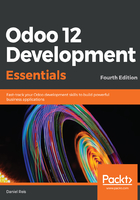
Odoo version policy
At the time of writing, Odoo's latest stable version is version 12, marked on GitHub as branch 12.0. This is the version we will work with throughout the book. In recent years, major stable versions have been released on a yearly schedule, in October, at the annual Odoo experience conference.
The last three stable versions are supported. With the release of 12.0, versions 11.0 and 10.0 are still supported, and version 9.0 stopped being supported. This means it will stop receiving bug and security fixes.
It's important to note that Odoo databases are incompatible between Odoo major versions. If you run an Odoo 11 server against a database created for a previous major version of Odoo, it won't work. Non-trivial migration work is needed before a database can be used with a later version of the product.
The same is true for add-on modules: as a general rule, an add-on module developed for an Odoo major version will not work on other versions. When downloading a community module from the web, make sure it targets the Odoo version you are using.
On the other hand, major releases (10.0, 11.0) are expected to receive frequent updates, but these should be mostly bug fixes. They are assured to be API-stable, meaning that model data structures and view element identifiers will remain stable. This is important because it means there will be no risk of custom modules breaking due to incompatible changes in the upstream core modules.
The version in the master branch will result in the next major stable version, but until then, it's not API-stable and you should not use it to build custom modules. Doing so is like moving on quicksand—you can't be sure when some changes will be introduced that will break your custom module.